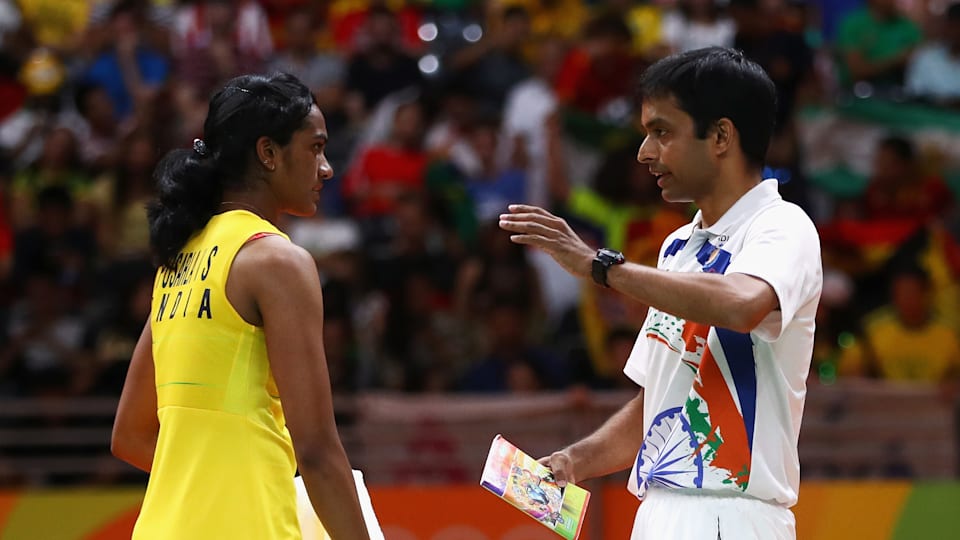Pullela Gopichand: Living the Olympic dream
The Indian badminton legend coached the likes of Nehwal and Sindhu, who won Olympic medals in 2012 and 2016 respectively.

“If you love the sport, if you love sharing knowledge and know that you don’t know at it all, I think you can be a good coach.” That’s how badminton legend Pulllela Gopichand began an exclusive interview with the Olympic Channel.
It’s tenets like these that have helped the former player-turned-coach revolutionise the Indian badminton landscape, with his academy unearthing the likes of PV Sindhu, Srikanth Kidambi and Saina Nehwal.
While Gopichand had to be content with a pre-quarterfinals finish at the 2000 Sydney Games, his efforts post-retirement have helped give the nation two Olympic medals in badminton; a bronze in 2012 and then going one better in 2016.
The unrequited dream
Gopichand was a promising badminton player in his day, winning two medals at the Commonwealth Games in 1998. Three years later, he further augmented his career by becoming the first Indian shuttler since Prakash Padukone to win the All England Open Badminton Championships.
An Olympic medal as a player though always evaded Gopichand. Having only made it to the pre-quarterfinal round in the 2000 Olympics, and marred by a recurring knee injury, Gopichand failed to play consistently in the years that followed. He believes these factors are what dragged him towards the next chapter of his career.
“Many of the things I learned in my life are from trial and error. So, by the end of my career, when I started to win, I kind of realised the formula to win,” says Gopichand, adding, “But unfortunately, I couldn’t use it too much on myself because I got injured. In that transition period between playing and resting, I almost drove myself to coaching.”
“I thought I knew something that could be useful for the juniors and should use it. It was almost like this element of knowing something and wanting to use it, and seeing whether it works or not, (was what) I think drove me into coaching very abruptly in a way, because the moment I saw myself playing lesser and lesser, I said, ‘Let’s start using this and helping juniors.’ And luckily for me, from the very beginning, results started to come,” said Gopichand.
The academy
In 2008, the renowned shuttler launched the Pullela Gopichand Badminton Academy in Hyderabad’s Gachibowli district, mortgaging his own house to fund the completion of the project. With world-class facilities and top-quality coaching, Gopichand’s academy helped transform the face of Indian badminton, giving the nation many more sporting heroes to cherish.
“For me, the intensity of work and quality of work is what matters. I think If you want to be good, you need to train at the level which you aspire to be at, and it needs to be consistent. The other factors are that you cannot train for 4-5 hours and spend the rest of the day doing things which are opposite of what is needed to be a top player.”
“It is important that your life is also streamlined in such a way that you kind of are focused totally, not only during the time that you are playing but when you are outside as well. (Ensuring) you are resting well, eating properly and disciplined in your thoughts,” said Gopichand, giving us an insight into his training ideals.
These ideals were quickly imbibed by his disciple Nehwal, who went on to reap the rewards at the 2012 London Games, where she won the nation’s first medal for badminton. Nehwal’s opponent in the bronze medal match, Wang Xin won the first game but suffered an injury at the start of the second and had to forfeit the game, helping the Indian script badminton history at the Olympics.
Speaking about Nehwal’s never-say-die attitude, Gopichand narrated an anecdote to the Olympic Channel from the 2008 Beijing Games, where she had squandered a lead in her quarterfinal clash against Maria Yulianti of Indonesia to lose the game.
“Nehwal was 18 years old and she lost in the quarterfinal. She probably didn't even know what she had missed. She was leading 11-4 in the third round and from there, she lost. When we were walking back, I jokingly said to her that tomorrow morning, we would be at the gym again. I didn’t expect her to say yes to that but she replied, ‘Bhaiya (brother), please can I sleep a little longer? I will reach there at 6:30.’ That’s the kind of the unstinted urge, faith, and belief she has, and that was really wonderful to see,” revealed Gopichand.
That steely determination, galvanised by Gopichand’s dedicated tutoring, is what helped Nehwal bury the ghosts of the Beijing Olympics four years later, as she claimed India’s maiden medal for badminton. As much as that was a triumph for the then 22-year-old shuttler, it was also a validation of the tireless efforts of Gopichand, who managed to live his Olympic dream vicariously.
